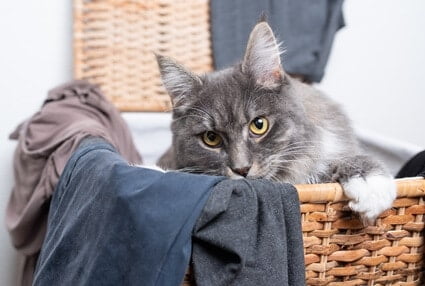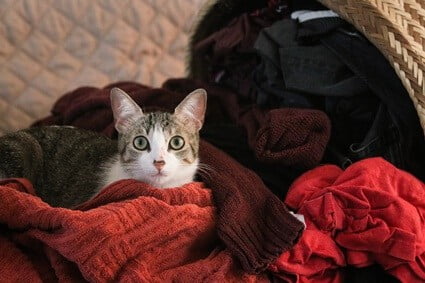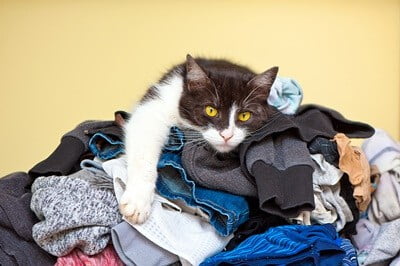Your cat has suddenly started peeing on your dirty, unwashed clothes or in your laundry basket. Some owners may find that their cat only pees on their husband’s or boyfriend’s clothes and not their own. Cat urine smells strongly of ammonia, and it can be tough to remove the foul odor. Also, the fabric can be permanently stained, rendering the clothing completely unwearable. The explanation for a cat peeing on clothes will have a medical or behavioral origin.
Cats often mark their territory with urine to claim it. Marking behavior is common when a cat shares territory with other cats. A cat that pees on clothing could be seeking attention from its owner because it’s jealous of another pet. Once a cat reaches sexual maturity, at 5-6 months old, it could be spraying clothing with urine to attract mates. Health issues, such as urinary tract infections, hyperthyroidism, diabetes, bladder stones, and bladder inflammation can lead to a cat urinating on clothing. Also, anxiety, stress, and fear can lead to the sudden loss of bladder control.
You should also ensure that your cat likes its litter box and that it’s able to access it without experiencing any discomfort. If you have an older cat with limited mobility, it may prefer a tray that has lower sides. The cause of feline urination on clothing needs to be identified and corrected with specific training or medical attention.
Why Has My Cat Started Peeing on Laundry Suddenly?
Cats urinate on human clothing due to:
- Territory marking
- Problems with the litter box
- Comfort
- Sickness, leading to incontinence
- Attention-seeking
Marking Territory
The most common explanation for marking territory is that the cat is:
- Insecure and marks territory to feel safe
- Expressing dominance over you
- In heat and attempting to attract a mate
- Anxious and wants to mark a regular, comforting location
Cats can feel insecure due to new pets or people in the house. If so, your pet may carve out a territory for itself, such as a pile of laundry, bedding, or your sneaker/shoes. Temper this insecurity with a reliable routine and one-on-one attention to reassure your cat that another pet will not replace it.
Dominance is common in unfixed cats, especially males, that want to show that they are the alpha cat. Spaying or neutering the cat will resolve many of these issues. Neutered males, in particular, are much calmer than their unfixed counterparts.
Female cats in heat will do whatever they can to attract a mate, including urinating and spraying constantly. If your cat is crying and begging to be let outside, she is likely in estrus. A cat in heat has strong-smelling urine, so she is sending a message to intact toms in the area.
Stress becomes a problem when a cat lives in a constant state of worry and anxiety, so the source of stress must be managed. By urinating on clothing, your cat is creating a safe space. It will return to the clothing for future eliminations.

Dislikes Litter Box
Urinary tract infections are most common in senior female cats. It may start to associate pain with using the litter box if it hurts your cat to pee. So, your cat will eliminate elsewhere, such as a soft and warm pile of laundry. Your cat may not like its litter box. Here are the reasons why a cat refuses to use a litter box:
- You have changed your cat’s litter to an unfamiliar or scented brand
- There is too much litter in the box
- The litter box is too small or uncomfortable
- The litter box has not been cleaned
- The litter box is located in a noisy or busy area
- Another pet has used the litter box
A cat that rejects its litter box still needs to eliminate, and indoor cats have limited options. Your cat will look for somewhere comfortable and familiar to pee. The scent of your clothes is ideal.
More Comfortable
Your cat may be urinating on your clothes through comfort as they love soft things. In addition, your clothing will smell like you. By urinating on clothing, your cat is making itself feel even more at ease.
It may not seem this way, but your cat is attempting to strengthen your bond. Cats often use scent to communicate with each other, and your cat sees you as another feline. The act of urination is sending a message to you.
However, you’ll need to train your cat out of this behavior. Don’t punish your cat as it won’t understand. Just restrict access, and train your cat to use its litter box.
Incontinence
If your cat is incontinent, accidents that damage your clothing are inevitable. Your cat may not make it to the litter box in time, so it thinks that peeing on your clothes is better than soiling the floor.
As The Veterinary Record explains, some cats are born incontinent, while other cats develop incontinence as they age. Common explanations for a cat becoming incontinent include:
- Urinary tract infections (UTIs)
- Nerve damage around the bladder
- Trauma to the bladder
- Overactive bladder
- Feline Cognitive Dysfunction
- Side effects of medication or anesthesia
- Kidney failure
- Consumption of toxins
Need for Attention
It is a myth that cats are indifferent to their owners, so your cat wants to feel important to you. If you are not fussing or playing with your cat, it will take certain actions to show you that something’s not right.
Your cat will know that clothing is important to you as it watches you get dressed every day. You’ll also spend hours washing, folding, and ironing your laundry. If your cat thinks it’s being ignored, it may pee on your clothes. Your cat is leaving an unmistakable scent to remind you that it’s still about.
Your cat may even be prepared to accept a scolding for its behavior as they come to view any attention as good attention. That’s why many owners complain that ‘my cat peed on my clothes right in front of me.’ Manage this by meeting your cat’s needs daily. Your cat will relax if it knows that food, petting, and playtime are coming at a certain time.
What Should I Do When My Cat Pees on My Clothes?
If you find cat pee on your clothes, you will be very displeased, but punishing a cat for peeing on clothing won’t correct this unwanted behavioral problem. Here’s why:
- If the cat is unwell, it cannot help having toilet accidents
- If the cat is stressed, punishment will magnify its anxiety
- If the cat wants attention, yelling provides this
What’s more, the cat will not connect the punishment to the crime. Your cat will not link your anger with the pee on your clothes. This will leave your cat confused as to why it is being punished.
If you see your cat weeing on your clothes, offer a firm, “no” command to distract the cat. You should then scoop up your cat and place it in the litter box. This will forge a connection between urination and litter. If you find cat urine on your clothes after the event, act as if nothing has happened.

How to Stop a Cat Peeing on Clothing
Learn why your cat is peeing on clothing. You must assess if the behavior is a training or medical issue. Provide your cat with its own room with no clothing anywhere. Fill it with everything your cat needs, including:
- Wet and dry food
- A supply of fresh water
- Cat trees and toys for entertainment
- A clean litter box
Keep the cat in this room for a period of time. Visit your cat and play with it, ensuring the cat’s routine is maintained. Check whether the cat uses the litter tray normally.
How to Get Cat Pee Out of Clothing
Cats will always be attracted to an area that smells familiar. This means that cats are more likely to urinate on your clothing in the future. Even if you have washed your clothes, there will be traces of the scent.
Do not rely on laundry detergent to clear the smell of cat urine. Not only will the scent linger, but it could soil other garments. Cat urine can also leave a yellow stain. Take these steps to remove the odor of cat wee:
- Rinse the stain with cold water
- Dab dry, don’t scrub as this drives stains deeper into the fabric
- Create a vinegar mix – 1 part white vinegar, 3 parts water
- Pour the vinegar mix on the clothing and let it sit for several minutes
- Cover the affected area with baking soda to mask the scent
- Wash the clothing in cold water, without detergent
- Leave the clothing to air dry
You will still need to undertake training if there’s a behavioral problem, but your cat is less likely to urinate on clothing if it smells unfamiliar. Spaying and neutering can also calm down a cat’s spraying activity. If your cat is peeing on clothes due to a medical condition, such as a UTI, bladder stones, or hyperthyroidism, this must be treated by a vet.

